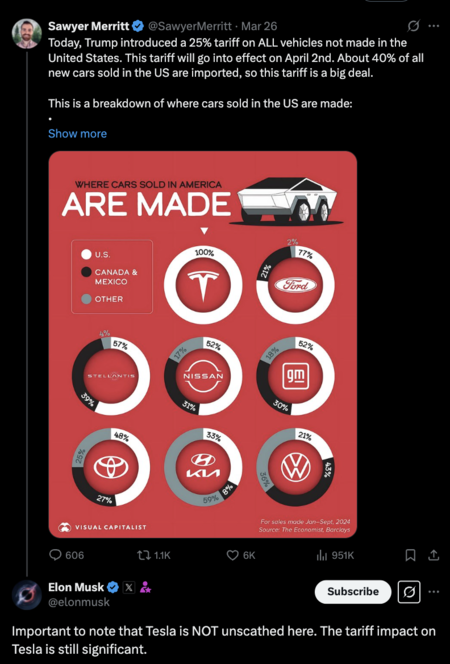After repeatedly threatening to do so, President Donald Trump finally approved a 25% tariff on all cars imported to the U.S. The measure applies to all cars, regardless of whether they were manufactured in Europe, Brazil, Mexico, or any other nation. This includes Canada, even though the U.S. has a special economic agreement with its neighboring country.
The only way to import a car at a lower cost is if it contains U.S.-made components. For instance, if a car is manufactured in Mexico, it won’t incur tariffs on the parts that are made in the U.S. Similarly, if a car is produced in the U.S. but its engine comes from Mexico or Canada, only the non-U.S. components will be subject to tariffs.
The impact of this measure on consumers will be significant, with estimates suggesting that cars could become $4,000 to $12,000 more expensive. This will depend on the car’s total value and the amount of U.S.-made components used.
The newly imposed tariff strategy clearly aims to attract more car production to the U.S. According to the White House, 16 million cars were sold in the U.S. in 2024, with half coming from outside the country. Authorities also claim that 50% of the components in the U.S.-made cars were sourced from abroad, although they believe the “average domestic content” is likely “closer to 40%.”
Bloomberg has identified several companies that will be primarily affected by the tariffs. Volkswagen, which exports 80% of its sales to the U.S., is among the most impacted. Other affected manufacturers include Hyundai-Kia (65%) and Mercedes (63%). Moreover, Renault-Nissan-Mitsubishi, BMW, and Toyota export more than 50% of their cars to the U.S.
In contrast, there are some clear winners from this tariff policy. For instance, Ford imports only 21% of the cars it sells in the U.S. This is less than Honda (35%) and General Motors (45%), its major competitors. Unsurprisingly, the biggest beneficiary is Tesla.
Tesla: The Unsurprising Winner
Since the confirmation of the new tariffs, all eyes have been on Tesla. CEO Elon Musk, a key figure in Trump’s second term, has tried to deny the claims on X.
In response to an X user who suggested that Tesla would benefit from the new tariffs, Musk pointed out, “Important to note that Tesla is NOT unscathed here. The tariff impact on Tesla is still significant.”
This response contrasts with the posts Tesla recently made on the same social media platform. On March 23, the automaker proudly said that its vehicles are the “most American-made cars” on the market.
Notably, Tesla has been in the spotlight since Musk’s influential role in the new U.S. government was confirmed. Trump’s decisions have affected Tesla less severely than its competitors. The company’s position as a market leader helps it navigate measures like the removal of the EV purchase subsidy. The president has even campaigned in favor of Tesla in response to the criticism it’s faced both domestically and internationally.
Interestingly, not all experts see Tesla’s advantageous position as clearly. “No matter how Tesla fans, or more accurately, Tesla shareholders, are trying to frame this, it isn’t good for anyone, including Tesla,” Electreck analysts point out.
The outlet reports that although the company assembles its cars in the U.S., the steel and aluminum used are sourced from outside the country’s borders. Around 25% of its components come from Mexico, with “an undisclosed amount from Canada.”
Despite this, the financial impact on Tesla will likely be less than that on its rivals. Any significant price increase for competitors could benefit Musk’s company because it may find it easier to absorb the costs, either partially or completely.
According to The New York Times, Tesla has been losing market share in recent months to the Chevrolet Equinox EV and the Ford Mustang Mach-E. Both models are manufactured in Mexico, meaning they should face a more substantial price increase compared to the Tesla Model Y.
Hyundai and Honda’s electric cars were among the best-selling EVs in the U.S. in 2024. Hyundai began manufacturing its Ioniq 5 domestically but produces its batteries (the most expensive component of the car) in South Korea. Meanwhile, the Honda Prologue is assembled in Mexico, and neither the Volkswagen ID.7 nor the Porsche Taycan is produced in the U.S.
Companies that don’t manufacture their cars in the U.S., such as Volkswagen and Porsche, are likely to encounter the most challenges competing on price with Tesla’s models, according to the Times. For instance, Volkswagen only produces the Volkswagen ID.4 in the U.S., while Audi and Porsche export all their vehicles from Mexico and Europe.
Toyota faces a similar situation. Although it assembles many cars in the U.S., it exports more than half of its sales volume there. According to Bloomberg, Toyota’s operating profit could decline by 6%. For its part, Nissan could see a decrease of more than 50%, given that it’s already experiencing significant challenges in the country.
Image | Reet Talreja
Related | Elon Musk Isn’t Just Influencing NASA. He’s Starting to Dominate It





